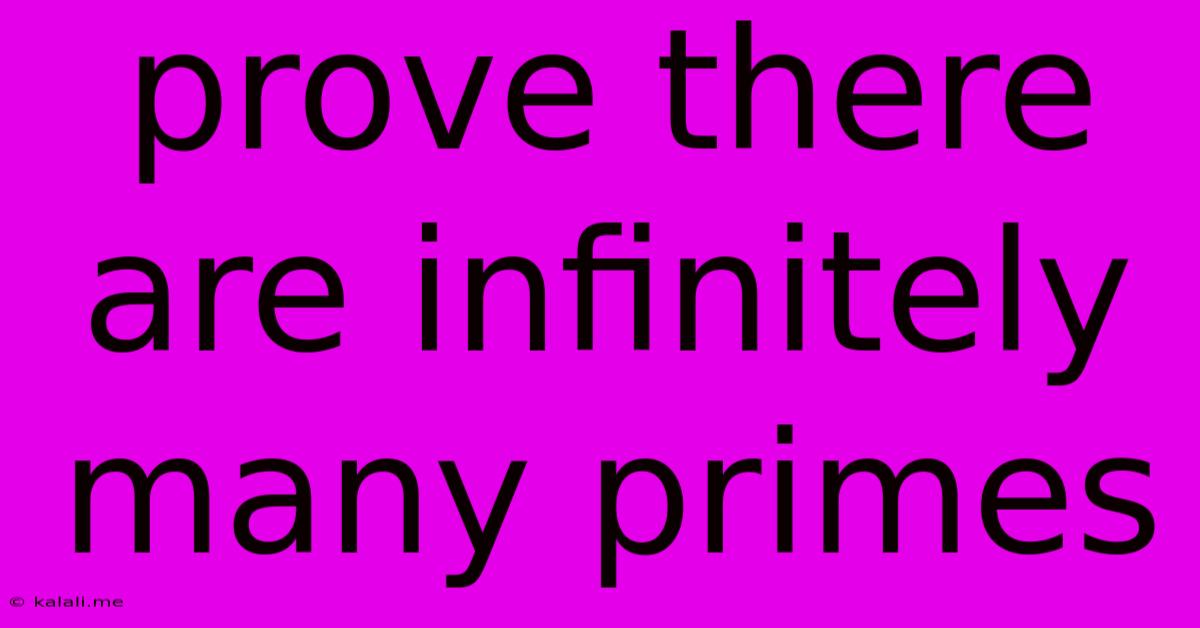Prove There Are Infinitely Many Primes
Kalali
May 20, 2025 · 3 min read

Table of Contents
Prove There Are Infinitely Many Primes: Euclid's Timeless Proof and Modern Interpretations
Meta Description: Explore Euclid's elegant proof demonstrating the infinity of prime numbers, along with modern interpretations and their significance in number theory. Discover why this fundamental concept remains crucial in mathematics.
The question of whether the sequence of prime numbers – 2, 3, 5, 7, 11, and so on – ever ends is a fundamental one in number theory. Surprisingly, the answer, proven millennia ago, is a resounding no. There are infinitely many prime numbers. This seemingly simple statement underpins much of modern mathematics, and its proof, attributed to Euclid, is a testament to the beauty and power of mathematical reasoning.
Euclid's Proof by Contradiction
Euclid's ingenious proof relies on a technique called proof by contradiction. The strategy is to assume the opposite of what we want to prove and then show that this assumption leads to a logical impossibility.
Let's assume, for the sake of contradiction, that there are only finitely many prime numbers. We can list them as p<sub>1</sub>, p<sub>2</sub>, p<sub>3</sub>, ..., p<sub>n</sub>, where p<sub>n</sub> is the largest prime number.
Now, consider a new number N formed by multiplying all these primes together and adding 1:
N = (p<sub>1</sub> * p<sub>2</sub> * p<sub>3</sub> * ... * p<sub>n</sub>) + 1
What can we say about N?
-
Case 1: N is prime. If N is prime, then we've found a prime number that's larger than p<sub>n</sub>, contradicting our initial assumption that p<sub>n</sub> is the largest prime.
-
Case 2: N is composite. If N is composite, it must be divisible by some prime number. However, none of the primes in our initial list (p<sub>1</sub>, p<sub>2</sub>, ..., p<sub>n</sub>) can divide N. Why? Because when you divide N by any of these primes, you'll always get a remainder of 1. Therefore, N must be divisible by a prime number that wasn't in our original list. Again, this contradicts our assumption.
In both cases, our initial assumption leads to a contradiction. Therefore, the assumption that there are only finitely many primes must be false. This elegantly proves that there are infinitely many prime numbers.
Modern Interpretations and Extensions
Euclid's proof, while simple in its elegance, holds profound implications. It demonstrates the fundamental nature of prime numbers as the building blocks of all integers. Furthermore, it has spurred numerous extensions and related theorems within number theory.
Many modern proofs offer alternative approaches, often utilizing more sophisticated mathematical tools. These alternative proofs, while perhaps more complex, often illuminate different aspects of the prime number distribution and provide further insights into the structure of numbers.
For instance, some modern proofs leverage the properties of the Riemann zeta function, a powerful tool in analytic number theory that reveals deep connections between prime numbers and complex analysis.
Conclusion
Euclid's proof of the infinitude of primes remains a cornerstone of number theory, a testament to the enduring power of simple yet profound mathematical arguments. Its enduring relevance lies not only in its historical significance but also in its continued influence on modern research and our understanding of the fundamental structure of numbers. The quest to understand the distribution of prime numbers remains a central theme in mathematics, with countless ongoing investigations built upon this foundational result.
Latest Posts
Latest Posts
-
What Are Try Squares Used For
May 20, 2025
-
Can You Cook Frozen Ground Meat
May 20, 2025
-
How Heavy Is 1 Liter Of Water
May 20, 2025
-
How To Stop A Cockerel Crowing
May 20, 2025
-
Looking Forward To Speaking With You
May 20, 2025
Related Post
Thank you for visiting our website which covers about Prove There Are Infinitely Many Primes . We hope the information provided has been useful to you. Feel free to contact us if you have any questions or need further assistance. See you next time and don't miss to bookmark.